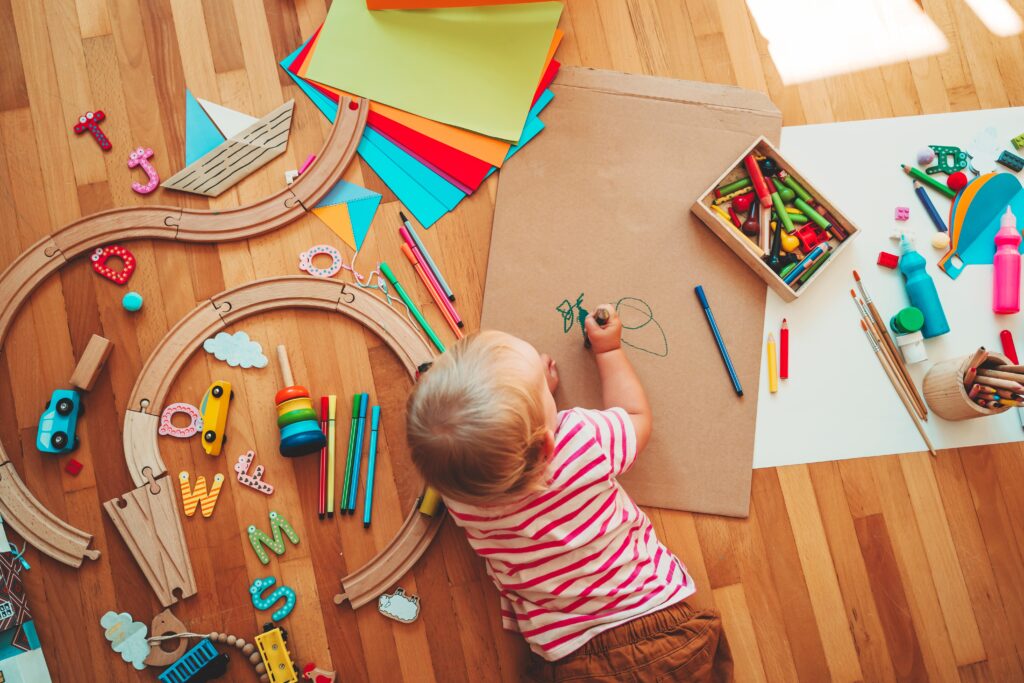Deciding when to enroll your child in daycare or private school is an important step, and starting early can bring lifelong benefits. From social skills to cognitive development, the earlier children are exposed to structured learning environments, the stronger their foundation becomes for future academic and social success. Here’s a breakdown of how each age range can offer unique advantages in a daycare or school setting.
1. Infant Care: 6 Weeks to 1 Year
Many families choose to start early, with daycare programs that accept infants as young as six weeks old. This age range is a prime time for sensory development and bonding in a safe, caring environment that helps foster a sense of security.
- Early Social Exposure: Even as infants, children can benefit from observing and interacting with other children and caregivers, laying the groundwork for social skills.
- Routine and Stability: Daycare offers structured schedules for feeding, play, and sleep, providing infants with a routine that promotes healthy development.
- Sensory Development: Engaging activities like tummy time, music, and sensory play support infants’ physical and cognitive growth, helping build strong neural connections.
2. Toddler Stage: 1 to 3 Years
The toddler years are a fantastic time to introduce children to daycare or early learning programs. Toddlers are curious, eager to explore, and ready to start developing more advanced social and cognitive skills. This stage is marked by:
- Socialization and Communication: Toddlers love to interact, and early exposure to peers fosters language skills, sharing, and basic empathy.
- Early Language and Cognitive Development: Through songs, storytelling, and interactive play, toddlers in daycare have a rich environment for language acquisition and cognitive skills.
- Building Independence: Toddlers enjoy activities where they can be hands-on and make choices. Daycare offers structured activities that help them build independence, self-confidence, and resilience.
Enrolling toddlers in daycare helps them make sense of the world around them, giving them essential communication skills and encouraging exploration and independence.
3. Preschool Age: 3 to 5 Years
Preschool is a crucial time for preparing children for kindergarten. Programs at this age focus on social and academic skills in a playful, engaging way, giving children a well-rounded foundation. Benefits include:
- School Readiness: Preschool introduces children to foundational concepts in literacy, math, and social studies through play-based learning, giving them an academic head start.
- Advanced Social Skills: Preschoolers learn about cooperation, empathy, and managing emotions, preparing them for the social dynamics of kindergarten.
- Stimulating Curiosity and Creativity: Activities like art, music, and imaginative play encourage children to express themselves and develop a love of learning.
Preschool sets children up for success by providing a balance of structured and exploratory activities that prepare them both socially and academically for kindergarten.
4. Private School Kindergarten: 5 to 6 Years
For families considering private school, kindergarten is an excellent time to start. By age 5 or 6, children are ready to take on a more structured, academic environment that supports continued growth and development:
- Strong Academic Foundations: Private schools often offer tailored programs that dive deeper into literacy, math, and science, setting children up for early academic success.
- Personalized Attention: Smaller class sizes in many private schools allow for individual guidance and attention, helping children excel in their unique areas of strength.
- Close-Knit Community: Private schools often emphasize a strong sense of community, helping children develop meaningful relationships with peers and teachers.
By beginning in kindergarten, children can fully benefit from the enriched learning and social environment that private school provides, fostering both academic growth and confidence.
Why Starting Early Matters
Starting your child in daycare or private school as early as possible can provide invaluable benefits that continue through their academic career. Here are a few additional reasons to consider beginning sooner rather than later:
- Developing a Love for Learning: Early exposure to structured learning environments helps children associate education with fun and curiosity, fostering a lifelong love for knowledge.
- Strengthening Social Skills: Consistent interaction with peers helps children understand teamwork, empathy, and communication.
- Building Confidence and Independence: Early learners develop a “can-do” attitude and confidence in new situations, which makes future transitions easier and sets them up for success.
Each stage of early education brings unique advantages, but the consistent theme is clear: the earlier children are introduced to supportive, engaging learning environments, the more prepared they are for school and life. Early learning not only builds academic skills but also shapes confident, curious, and socially aware individuals. Starting early truly sets the stage for a future filled with success, resilience, and a love for learning.
When it comes to providing your child with a strong educational foundation, I’m Just a Kid offers the perfect environment for nurturing young minds. With a focus on early socialization, cognitive development, and hands-on learning, our programs are designed to meet each child where they are, offering a personalized experience that promotes curiosity and self-confidence. From sensory activities for infants to more structured academic preparations for preschoolers, we provide a balanced approach that supports both emotional and academic growth. Whether you’re starting your child’s educational journey or preparing them for the next step, I’m Just a Kid ensures they have the tools they need to thrive, grow, and succeed.
